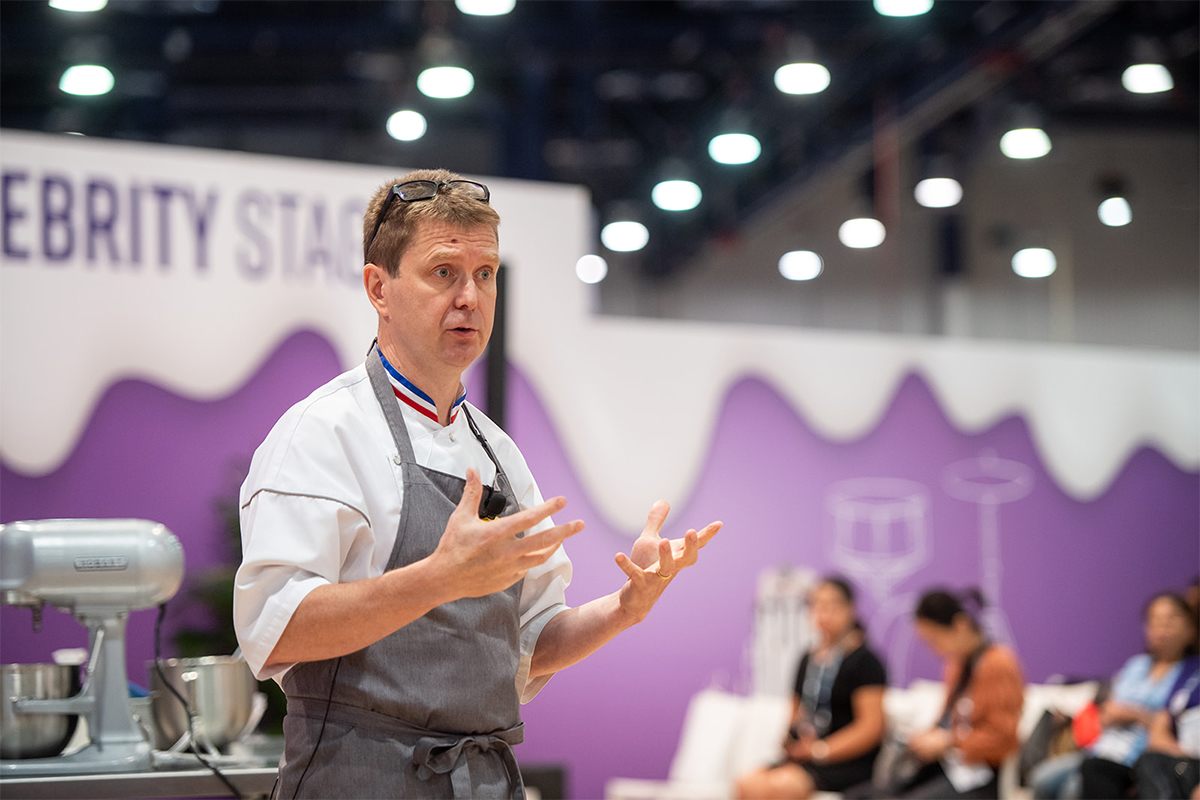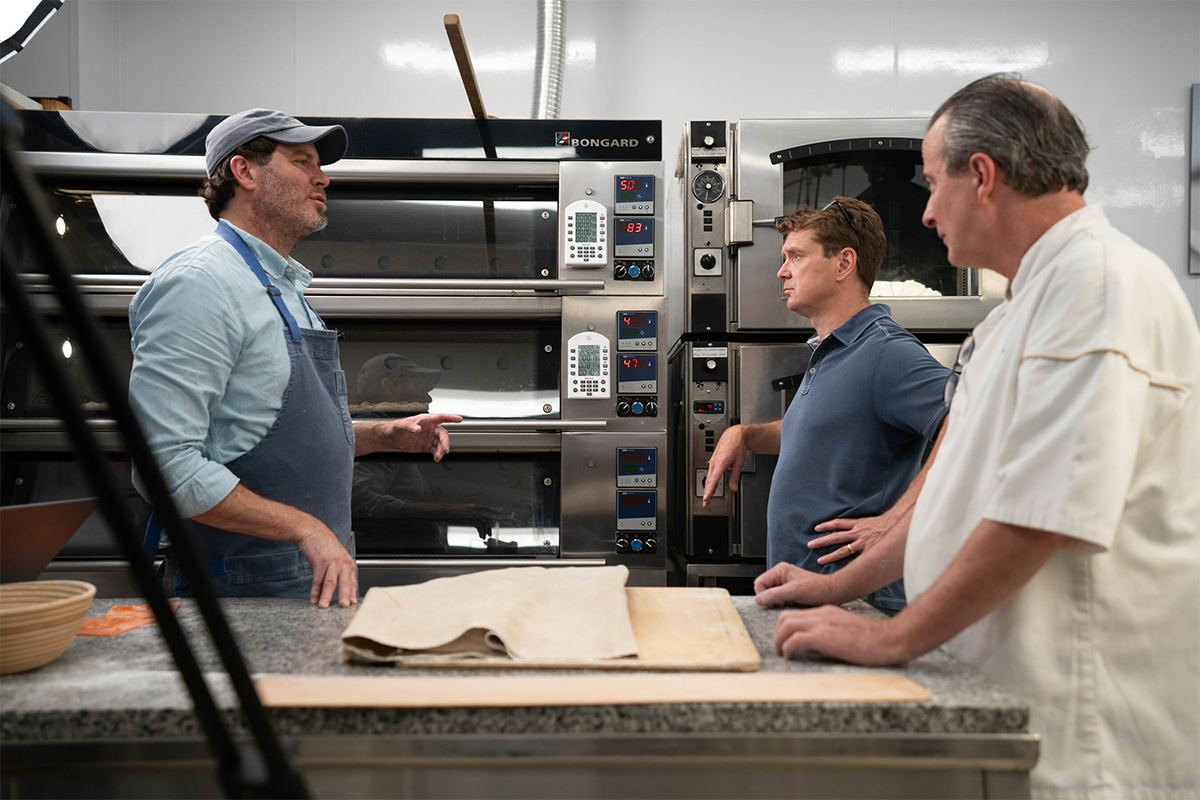Sébastien Canonne, M.O.F., is man who wears many hats. This French pastry chef and co-founder of the French Pastry School in Chicago, Canonne earned the title of Meilleur Ouvrier de France and in 2015 was named a Knight by the French government in the National Order of the Legion of Honour.
His latest project involves work with EQUII, a trailblazing brand on a mission to redefine what we expect from our staple foods. The organization believes that nutrition and taste can coexist harmoniously. Founded in 2021 by accomplished food scientists Monica Bhatia Ph.D and Baljit Ghotra Ph.D along with Canonne, EQUII's products are designed to provide exceptional nutrition without compromising on flavor, making them a delicious choice for health-conscious individuals and those seeking balanced nutrition. For more information, visit www.equii.com.
In October, EQUII, the innovative high complete protein and low carb bread company, announced Chad Robertson, founder of Tartine Bakery and acclaimed baking visionary, as an EQUII Ambassador. Chad will be collaborating closely with the EQUII team, including EQUII co-founder Canonne to develop exciting new bread products utilizing EQUII's high protein and low carb baking mix.
To learn more about the current landscape of pastry, baking, and consumer food, Bake magazine connected with Canonne recently to offer his perspective on where we have been and where we are heading.
Bake: What do you consider to be the most influential developments happening today in the creation of premium quality pastries?
Sébastien Canonne: I think that highly nutritional plant base is the most influential development happening today and it has been for many years, but today the plant-based pastry must taste good, and the ingredients must be functional. Gone are the days of long ingredient lists and ingredient names you can’t pronounce. We have so many new tools when it comes to replacing or reducing animal proteins and improving our diet and our food system.
Fungi, nuts, fermented grains, plant-based dairy, or egg replacements are now ingredients of premium quality breads and pastries. Looking back at my most impactful research and development projects and the types that won innovation awards, 5 years ago, I dived into the world of fungi-based protein and joined the team of Nature’s Fynd to discover the versatility of fungi in pastry and baking. A couple of years later, I partnered with Bridor to launch “The Pains Cuisinés”, a line of bread that would satisfy the growing desire for healthier bread, new tastes, textures, and flavor combinations.
 Image courtesy of IBIE
Image courtesy of IBIELast year, I joined renowned scientists, Doctors Monica Bathia and Baljit Ghotra and co-founded EQUII, a food tech company and fermented grain platform, repurposing starch in grain and manufacturing a complete plant-based yeast protein. Grain being the largest sustainable commodity on the planet, our mission is to solve two massive global issues, Balanced Nutrition and Sustainable Proteins. None of these major product developments would have happened if I had not been afraid of crossing paths and focusing on nutrition and sustainability.
At EQUII, our team of chefs and scientists want to disrupt the everyday pantry staples with a highly nutritional and digestible complete protein. One that would help establish a food system that is healthier, delicious, and sustainable. Our protein contains the 9 essential amino acids our body needs to maintain healthy tissues, organs, and muscles. In addition, during the fermentation process of the protein making, the microorganisms feed on starch, depleting its carbs content.
This year, EQUII launched its first line of product, a complete protein/low carbs line of breads with good sources of protein and fiber claims for the retail and foodservice and was awarded the coveted Food and Beverage Innovation Award at the National Restaurant Association in May. The consumer understands the importance and balance of macronutrients. The right amount and kinds of proteins, carbs, and fats. Accordingly, I think that the consumer will favor plant-based, complete protein, complex carbs, and unsaturated fats. I also believe that they will increasingly buy more clean labels, non-GMO, low ingredient count, and chef-crafted tasty kinds of food products.
Bake: On the consumer front, we are seeing increased demand for “hybrid” bakery products that combine traditional pastry with new twists (the Cronut, for example). What can we learn from this ongoing development and how do pastry professionals innovate in the field of new product development while holding on to time-tested production methods?
That is a very good question. One that chefs and innovators should really think about in their quest to find the next big innovative product. I have been involved in research and development for as long as I have been teaching John, and I practiced these two verticals simultaneously because they are ultimately indissociable.
One can’t start twisting traditional pastries unless they master them first. Meaning that most innovations find their roots in knowledge. Dominique Ansel, the creator of the cronuts, made millions of croissants and a fair number of donuts I am sure, before he envisioned combining both. It is that expertise and know-how that enabled him to combine them. He combined a yeasted laminated dough and a yeasted dough. A croissant is nothing less in essence than the know-how combination of making a brioche and a puff pastry dough. The cronut is the same concept but fried. Innovation is what keeps fueling your drive and your need to learn, push boundaries, and unlock what others have not been able to unlock before, which is why education and innovation are indissociable.
Holding on to time-tested production methods is key for manufacturing but nutrition is where the next big things will be. Over the years, I have been involved with many research and development projects and in all areas of expertise of culinary. But for the past 10+ years, the most successful projects I collaborated with were projects from visionary leadership focusing on products that would be healthier and more sustainable.
Bake: What is happening (or what needs to happen) on the following fronts to ensure continued success? Flavor? Texture? Shelf life? Other key factors?
When it comes to flavor and texture, I would say that experts should not be afraid to cross over. Pastry chefs should think more like savory chefs when it comes to flavors and texture combinations, and savory chefs should think more like pastry chefs when it comes to techniques and visuals. Both should also become frustrated food scientists and food scientists working with them should become frustrated chefs. I worked with many brilliant scientists, a few who were frustrated chefs, and several who said that I was a frustrated scientist myself. However, the more I learned about science, the more I realized I knew very little about it.

Tartine founder Chad Robertson with EQUII's Chef Sébastien Canonne, M.O.F. and Chef Eric Perez.
| Source: EQUIIAnd the same goes for scientists learning about culinary. There are great examples of breakthrough culinary innovations where scientists worked very closely with chefs. That is what for example gave birth to nouvelle cuisine, molecular gastronomy, or the sous vide techniques used today. That is what needs to happen to do what others don’t do, how to make what doesn’t seem possible, possible to disrupt a food category! Nutrition and sustainability are the next big things.
Pastry chefs understand innovation, but they limit their work to the visual aspect of their creations, interchanging flavors, or at best trying some bold flavor combinations. Innovation is much more important today. Innovation today means that delicious and appetizing food needs to also be nutritious and that what is good for you should also be good for the planet.
Bake: As online education gains prominence, what are important resources that are “musts” for pastry professionals?
I have been teaching for the past 25 years and I understood a long time ago that the culinary education model needed new tools. An affordable and sustainable model for the food industry. A platform that would supplement any prior training or the day-to-day training on the job. One that would not require students or career changers to quit their jobs and to move and commit to a brick-and-mortar school model. A tool that would be available when students wanted it and for as long as they wanted it.
One that would allow the students to see, hear, and repeat these training steps as many times as needed. A tool that would enable students to monitor their progress or share it with their employer investing in their professional development.
Bake: How is online training progressing, and what are we learning about the effectiveness – and future needs – for this educational format?
To be honest, I was hesitant at first to switch over from full brick-and-mortar programs to an online supplemental education one, but it is nothing different than one of the European or old US union trade apprentice programs, where education comes to supplement your day-to-day training on the job. Online training is an affordable and flexible tool that allows a trainee to go through basic, advanced, or cross-training, and a valuable incentive employee benefit that allows the industry to attract and retain talents.
Public and culinary schools, global hospitality leaders like the Marriott corporation, Princess Cruises, or the United States Army culinary teams are already using The Butter Book platform as such supplemental learning tool.
To be effective, online training needs to offer a wealth of instructional content and cater to all skill levels. It needs to be a comprehensive platform that delivers the same methodology students were exposed to in a brick-and-mortar school, meaning, engaging content, from beginner to advanced, with expert insights, answers to the predictable questions, quizzes, and the necessary time management features you need in a kitchen. When I thought of The Butter Book platform, I wanted to provide the industry with the best customizable tool. Something that was adapting to today’s needs. A platform and content with all the knowledge we were fortunate to acquire as professionals, and our expertise in educating for the past 25 years.
Bake: What are other key thoughts or innovative programs to consider?
The most important thing I learned is that a good online educational tool is no different than training in the kitchen or attending a brick-and-mortar school program. It must be built by experts and educators to provide you with the comprehensive training and tools needed to succeed. In fact, it requires a lot more experts, time, and investment, including top videographers, editors, script, and voice-over professionals, learning management system programmers, and digital education experts. The platform needs to follow the building block model, drilling the importance of the basics and fundamentals before delving into the realms of recipes!
A wealth of knowledge, and understanding of science, technology, methods, and techniques to improve skills. The Learn, apply, and repeat mantra! It took our team 5 years to build that platform. This was a massive undertaking development. The platform covers pastry making, bread baking, and cake decorating, and only experts in their fields contributed to the platform. We are very proud to have been awarded this year as the best online baking platform by The Spruce Eats, Kitchen Business, and by Saveur the years before. The Butter Book is also approved and endorsed by the best in the industry; the American Culinary Federation, Retail Bakers of America, Home Baking Association, Académie Culinaire, and Maîtres Cuisiniers de France, all appreciated testimonials to the work, time, and vison it took our team to build such tool.




